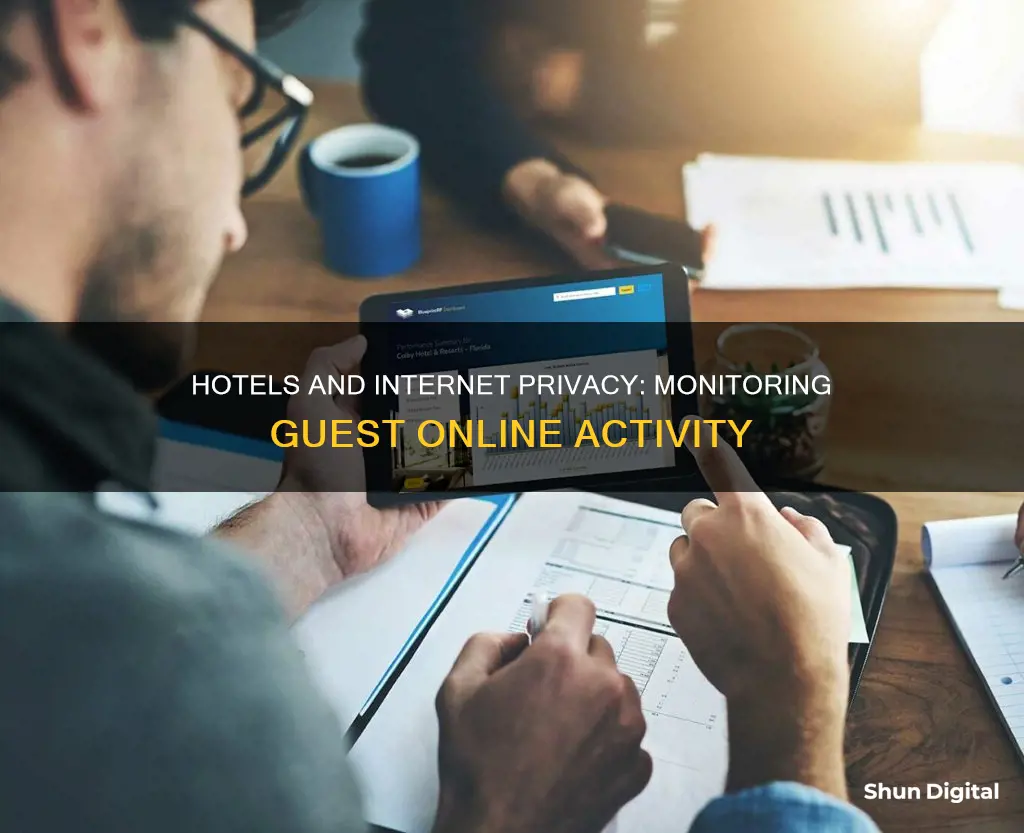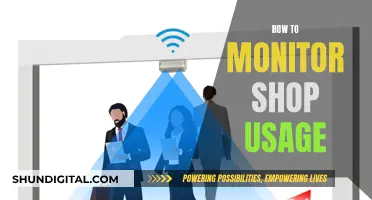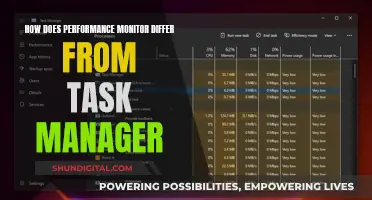
Hotels offering free Wi-Fi to their guests is a common practice, but how closely do they monitor their guests' internet usage? The short answer is yes, hotels can see what websites their guests visit and how much time they spend on each. Hotel servers usually have a log file that lists every connection the server makes while their guests browse using its network. This includes the time logged in and out, the guest's name or ID number, and their room number. However, this doesn't mean that hotel staff actively tracks each person's internet activity. Hotels monitor internet usage to ensure their guests aren't abusing download or bandwidth quotas and to comply with legal requirements. To protect your privacy when using hotel Wi-Fi, it is recommended to use a Virtual Private Network (VPN) or a personal hotspot.
| Characteristics | Values |
|---|---|
| Can hotels see what websites you visit? | Yes, hotels can see what websites you visit. They can see the top-level domains and how much time is spent on each one. |
| Can hotels see what you’re watching on TV? | If the hotel offers pay-per-view (PPV) TV, then yes, the hotel can see exactly what you watched and when. This is less likely with free-to-air or standard cable channels. |
| Can hotels see what you do on apps? | Yes, to some extent. Someone with admin credentials for the WiFi router can identify what app you’re using and potentially intercept data. |
| Can hotels see your browsing history? | No. They can only see the websites you visit while using their network. |
| Can hotels see what you are browsing on incognito? | Yes, hotels can see what you are browsing on incognito. Incognito mode only hides your history from other users of your device. |
| Can hotels see what you are browsing with a VPN? | No, hotels can't see what you are browsing if you use a VPN, unless they break the cryptography of the tunnel. |
| Can hotels monitor their Wi-Fi? | It’s difficult to tell whether or not a particular hotel monitors its network and how much. Network administrators can see at least some information, such as browsing data and personal details. |
What You'll Learn

How to protect your privacy
Hotels can monitor your internet activity and see what websites you visit, even if you're using incognito mode. They can also see your personal details, such as your name, email, and room number. While hotels don't usually read your emails, they can still see your browsing data, such as login/logout times and time spent on a website.
Use a Virtual Private Network (VPN)
Using a trusted VPN is the most effective way to protect your privacy when using hotel Wi-Fi. A VPN encrypts your internet connection, making it difficult for hackers or hotel staff to intercept and read your data. Look for a reputable paid VPN service that prioritises your privacy and security.
Turn Off Auto-Connect and Auto-Connect to Unknown Networks
Ensure your device doesn't automatically connect to any available Wi-Fi network. This will give you the chance to verify that the network is legitimate and secure before connecting.
Use a Mobile Hotspot or Mobile Data
Using your own mobile hotspot or mobile data is a more secure option than connecting to public Wi-Fi. Keep in mind any data limits and roaming charges that may apply.
Keep Your Devices and Software Updated
Keep your operating system, applications, and security software up to date. Updates often include patches for newly discovered vulnerabilities, so staying updated will help protect your privacy and security.
Enable a Firewall
Most operating systems have a built-in firewall that helps protect your device from malicious internet traffic. Make sure your firewall is enabled before connecting to a public network.
Avoid Sensitive Activities and Sites
Avoid logging into sensitive accounts or visiting sensitive sites that require you to enter personal or financial information. This includes online banking, email, social media, and retail websites. If you must access these accounts, use a secure private hotspot or your mobile data connection.
Use Strong Passwords and Multi-Factor Authentication
Use strong, unique passwords for your accounts and enable multi-factor authentication for added security. This will make it more difficult for hackers to access your accounts, even if they have your password.
Be Wary of Fake Networks and Login Pages
Hackers often create fake Wi-Fi networks or login pages to trick users into connecting or entering their personal information. Verify the name of the Wi-Fi network with hotel staff before connecting, and never use third-party platforms like Facebook, Google, or Okta to sign in.
Read the Hotel's Privacy Policy
Read the hotel's privacy policy to understand what information they collect and how they plan to use it. If you find anything suspicious or concerning, avoid using their Wi-Fi network.
Use Additional Security Software
Consider using additional security software, such as antivirus software or threat protection services, to further protect your device from malware and other cyber threats.
Remember, public Wi-Fi networks, including hotel Wi-Fi, are inherently insecure. Following these steps will help protect your privacy and security, but the safest option is to avoid using public Wi-Fi altogether when dealing with sensitive information.
Smart Meter Gas Usage: Monitored or Not?
You may want to see also

What hotels can and can't see
Hotels can see what websites you visit when using their Wi-Fi. They can see the top-level domains and how much time is spent on each one. For example, they can see that you spent time on YouTube, but they are unlikely to be able to see which videos you watched. They can also see your browsing data, such as the IP addresses you contact, login and logout times, and the time spent on a website. They can also see personal details such as your name and room number.
However, they cannot see the specific pages you visit within a website unless it is unencrypted (http instead of https). In this case, they may be able to track your activity within that site. They also cannot see the exact contents of your communications.
Hotels monitor internet activity to ensure that guests are not abusing download or bandwidth quotas. They may also use the data for marketing purposes, to learn more about their guests' preferences and history. Additionally, they need to ensure that guests are not visiting restricted or illegal websites to avoid legal troubles.
Hotels cannot see your history before or after using their Wi-Fi. They can only see the websites you visit while using their network.
If you use a Virtual Private Network (VPN), hotels cannot see what you are browsing unless they break the cryptography of the tunnel. A VPN creates a separate tunnel for you to connect to the internet, encrypting your data before sending it to the ISP through the tunnel. This prevents the ISP and hotel servers from seeing what you are trying to access.
To protect your privacy when using hotel Wi-Fi, you can use a VPN, turn on a firewall, and avoid making sensitive transactions. You should also secure your accounts with strong passwords and multi-factor authentication.
Beware: Your Boss May Monitor Your Internet Usage
You may want to see also

How to browse safely
Hotels can monitor your internet activity and see what websites you visit, even if you're using incognito mode. They can also see your private browsing history. This is because hotels can see which domains you visited and how long you spent there. This is true even if they can't see what videos you watched or the specific pages you visited within a website.
- Use a Virtual Private Network (VPN): This is the single most effective way to safely connect to hotel Wi-Fi. A VPN creates a separate tunnel for you to connect to the internet and encrypts your data, so network administrators and hotel management can't see what you're doing online.
- Use your own mobile hotspot: Using your own hotspot means you don't have to connect to public Wi-Fi at all. You can use a dedicated Wi-Fi hotspot with its own SIM card or your smartphone as a hotspot, but keep an eye on mobile data limits and roaming charges.
- Keep your system up to date: Keep your operating system and antivirus software up to date to protect yourself from known, patched vulnerabilities.
- Use a firewall and antivirus software: Make sure your firewall is turned on and that you know how to use it. Windows and macOS users should also use up-to-date antivirus software.
- Turn off network discovery: Turn off network sharing and network discovery to make it harder for hackers to find your devices on the network.
- Be cautious about the sites you visit: Avoid doing online banking or engaging in other sensitive activities if you have any doubts about the internet access in your hotel. Don't log into sites that have your personal information, like banking or financial sites.
- Change your passwords: Before travelling, change your passwords for any sites you might access while using hotel Wi-Fi. Use strong, auto-generated passwords that are hard to crack.
- Check your settings: Don't let the hotel Wi-Fi auto-connect. Make sure the hotspot is legitimate before connecting. Don't let your device share your files and folders.
- Turn on multi-factor authentication: This adds an extra layer of security, as hackers won't be able to log into your accounts even if they have your passwords.
- Read the hotel Wi-Fi's privacy policy: Check what information the hotel stores and how they plan to use it. If you find anything suspicious, don't connect to their Wi-Fi.
Remember, even with these precautions, no system is completely safe. If you're dealing with extremely sensitive information, you may want to avoid using hotel Wi-Fi altogether.
Battery-Sapping Security Apps: Monitor Your Usage
You may want to see also

How to browse safely on apps
Hotels can monitor your internet activity and see what websites you visit, even if you're browsing in incognito mode. They can also see what apps you're using and potentially what you're doing on them. However, there are several ways to browse safely on apps when connected to hotel Wi-Fi:
Use a Virtual Private Network (VPN)
A VPN lets you browse the internet anonymously, hiding your location and IP address. It also has the added benefit of allowing you to access geo-blocked content. There are many free and paid VPN options available for Android and iOS devices.
Switch to a Third-Party DNS Resolver
Your Internet Service Provider (ISP) usually handles the DNS resolver, which translates domain names into IP addresses. However, they may not employ the highest-quality DNS, resulting in poor encryption and potential snooping. By switching to a third-party DNS resolver, you can improve security and prevent your ISP from logging your browsing history. Cloudflare's 1.1.1.1 is a reliable and easy-to-set-up option.
Install a Privacy-Focused Browser
Consider using a privacy-focused browser like Firefox Focus, which is designed to secure your digital presence. It doesn't have a browsing history, tabs, or bookmarks, and it comes with tools to obstruct trackers and cookies.
Tweak Your Current Browser Settings
Most modern browsers have security options to protect you from trackers and other hazards. For example, Google Chrome has a "Safe Browsing" switch that blocks hazardous websites and is available in Settings > Advanced > Privacy.
Avoid the Browser's Password Manager
While convenient, built-in password managers may not have the best encryption and can be exploited by deceptive websites. Instead, use a dedicated password manager, which offers better encryption and works across all browsers and platforms.
Keep Unknown App Sources Disabled
On Android devices, it's important to keep the "Unknown App Sources" setting disabled to prevent malware agents from taking over your phone. Only enable this setting when installing trusted apps from outside the Play Store.
Get a Malware Scanner
If you frequently download files from the internet, it's a good idea to have a malware scanner to check for hidden viruses. Antivirus apps on Android often include additional features such as anti-theft and performance management tools.
Scan Public Wi-Fi
Public Wi-Fi networks may monitor your traffic, so consider installing a separate Wi-Fi security app like ARP Guard, which alerts you to any unusual activities on the network.
Internet Surveillance: Schools' Monitoring of Students' Online Activity
You may want to see also

How to avoid data theft
Hotels can monitor your internet activity and see what websites you visit, even if you're using private or incognito mode. They can also see basic information, like your device information and the time of your connection. This information is usually stored in a log file, which hotels use to ensure guests are not abusing download or bandwidth quotas and for marketing purposes.
Use a Virtual Private Network (VPN)
Using a trusted VPN is the most effective way to protect your data when connecting to hotel Wi-Fi. A VPN encrypts your data, making it difficult for anyone else to access. It will also allow you to bypass any restrictions the hotel may have on certain websites.
Keep your devices and applications updated
Outdated software is a common way for scammers to hack into your devices. By keeping your devices updated, you can protect yourself from known vulnerabilities and security threats.
Use antivirus software
Antivirus software can detect, block, and remove malware from your devices. It is important to have this protection, especially when connecting to public Wi-Fi networks.
Turn off file sharing and Bluetooth
When using public Wi-Fi, it is best to turn off file sharing on your device. This will prevent others on the network from accessing your files. Similarly, turning off Bluetooth will reduce the risk of hackers accessing your device through a Bluetooth connection.
Use mobile data or a mobile hotspot
Using your phone's mobile data connection or creating a password-protected mobile hotspot is a safer alternative to hotel Wi-Fi. This allows you to bypass the hotel network altogether and reduces the risk of data theft.
Be cautious when logging in
When logging into the hotel Wi-Fi, confirm the exact name of the network with the staff to ensure you are not connecting to a fraudulent network. Also, avoid entering sensitive personal information when logging in. If a network requires excessive personal details, it may be fraudulent.
Avoid critical accounts and sensitive information
Even with a VPN, it is best to limit your online activity on public Wi-Fi. Avoid logging into important accounts like online banking, retirement accounts, or government portals. Do not enter sensitive information such as your Social Security number, passport number, or credit card number.
Use security apps and firewalls
In addition to antivirus software, consider using security apps like firewalls or VPNs. These apps can provide an extra layer of protection and help fight off cybercriminals who try to access your device.
Change passwords and enable multi-factor authentication
Before travelling, change your passwords for any accounts you may use during your trip. This will ensure that even if a hacker gains access to your device, they won't be able to access your accounts. Enabling multi-factor authentication adds an extra layer of protection, as it requires physical access to your device.
By following these precautions, you can significantly reduce the risk of data theft when using hotel Wi-Fi.
Monitoring Electricity Usage: A Guide to Tracking Your Power Consumption
You may want to see also
Frequently asked questions
Yes, hotels can monitor your internet activity. They can see what websites you visit and how long you spend on each one. They can also see your browsing data (the IP addresses you contact, login/logout times, and time spent on a website) as well as personal details (name, room number).
Yes, to some extent. Someone with admin credentials for the WiFi router can watch your internet traffic and potentially identify what app you're using. Depending on the app, they may also be able to intercept data and see what you're doing.
You can use a Virtual Private Network (VPN) to disguise your IP address and encrypt your data. You can also use a mobile hotspot, keep your system updated, use a firewall and antivirus software, and turn off network discovery.







